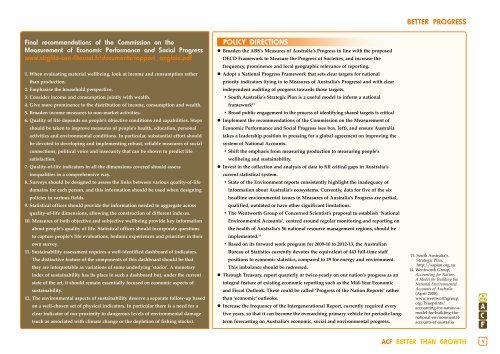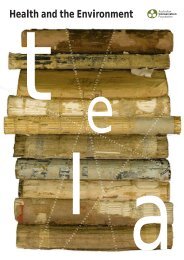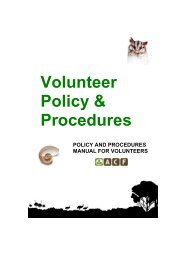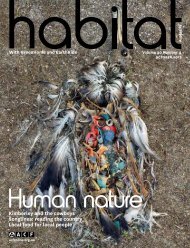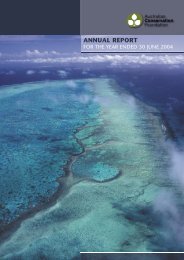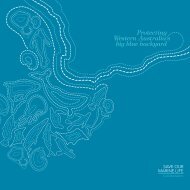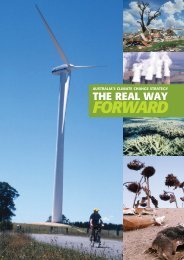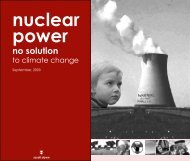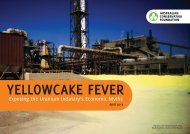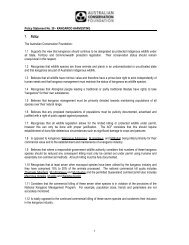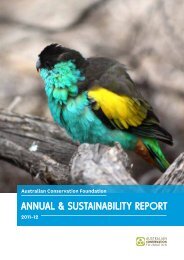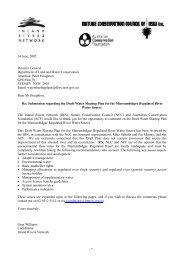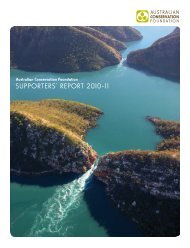Better than growth - Australian Conservation Foundation
Better than growth - Australian Conservation Foundation
Better than growth - Australian Conservation Foundation
You also want an ePaper? Increase the reach of your titles
YUMPU automatically turns print PDFs into web optimized ePapers that Google loves.
etter progress<br />
Final recommendations of the Commission on the<br />
Measurement of Economic Performance and Social Progress<br />
www.stiglitz-sen-fitoussi.fr/documents/rapport_anglais.pdf<br />
1. When evaluating material wellbeing, look at income and consumption rather<br />
<strong>than</strong> production.<br />
2. Emphasise the household perspective.<br />
3. Consider income and consumption jointly with wealth.<br />
4. Give more prominence to the distribution of income, consumption and wealth.<br />
5. Broaden income measures to non-market activities.<br />
6. Quality of life depends on people’s objective conditions and capabilities. Steps<br />
should be taken to improve measures of people’s health, education, personal<br />
activities and environmental conditions. In particular, substantial effort should<br />
be devoted to developing and implementing robust, reliable measures of social<br />
connections, political voice and insecurity that can be shown to predict life<br />
satisfaction.<br />
7. Quality-of-life indicators in all the dimensions covered should assess<br />
inequalities in a comprehensive way.<br />
8. Surveys should be designed to assess the links between various quality-of-life<br />
domains for each person, and this information should be used when designing<br />
policies in various fields.<br />
9. Statistical offices should provide the information needed to aggregate across<br />
quality-of-life dimensions, allowing the construction of different indexes.<br />
10. Measures of both objective and subjective wellbeing provide key information<br />
about people’s quality of life. Statistical offices should incorporate questions<br />
to capture people’s life evaluations, hedonic experiences and priorities in their<br />
own survey.<br />
11. Sustainability assessment requires a well-identified dashboard of indicators.<br />
The distinctive feature of the components of this dashboard should be that<br />
they are interpretable as variations of some underlying ‘stocks’. A monetary<br />
index of sustainability has its place in such a dashboard but, under the current<br />
state of the art, it should remain essentially focused on economic aspects of<br />
sustainability.<br />
12. The environmental aspects of sustainability deserve a separate follow-up based<br />
on a well-chosen set of physical indicators. In particular there is a need for a<br />
clear indicator of our proximity to dangerous levels of environmental damage<br />
(such as associated with climate change or the depletion of fishing stocks).<br />
Policy directions<br />
• Broaden the ABS’s Measures of Australia’s Progress in line with the proposed<br />
OECD Framework to Measure the Progress of Societies, and increase the<br />
frequency, prominence and local geographic relevance of reporting.<br />
• Adopt a National Progress Framework that sets clear targets for national<br />
priority indicators (tying in to Measures of Australia’s Progress) and with clear<br />
independent auditing of progress towards those targets.<br />
• South Australia’s Strategic Plan is a useful model to inform a national<br />
framework 13<br />
• Broad public engagement in the process of identifying shared targets is critical<br />
• Implement the recommendations of the Commission on the Measurement of<br />
Economic Performance and Social Progress (see box, left), and ensure Australia<br />
takes a leadership position in pressing for a global agreement on improving the<br />
system of National Accounts.<br />
• Shift the emphasis from measuring production to measuring people’s<br />
wellbeing and sustainability.<br />
• Invest in the collection and analysis of data to fill critical gaps in Australia’s<br />
current statistical system.<br />
• State of the Environment reports consistently highlight the inadequacy of<br />
information about Australia’s ecosystems. Currently, data for five of the six<br />
headline environmental issues in Measures of Australia’s Progress are partial,<br />
qualified, outdated or have other significant limitations.<br />
• The Wentworth Group of Concerned Scientist’s proposal to establish ‘National<br />
Environmental Accounts’, centred around regular monitoring and reporting on<br />
the health of Australia’s 56 national resource management regions, should be<br />
implemented. 14<br />
• Based on its forward work program for 2009-10 to 2012-13, the <strong>Australian</strong><br />
Bureau of Statistics currently devotes the equivalent of 443 full-time staff<br />
positions to economic statistics, compared to 29 for energy and environment.<br />
This imbalance should be redressed.<br />
• Through Treasury, report quarterly or twice-yearly on our nation’s progress as an<br />
integral feature of existing economic reporting such as the Mid-Year Economic<br />
and Fiscal Outlook. These could be called ‘Progress of the Nation Reports‘ rather<br />
<strong>than</strong> ‘economic’ outlooks.<br />
• Increase the frequency of the Intergenerational Report, currently required every<br />
five years, so that it can become the overarching primary vehicle for periodic longterm<br />
forecasting on Australia’s economic, social and environmental progress.<br />
13. South Australia’s<br />
Strategic Plan,<br />
http://saplan.org.au<br />
14. Wentworth Group,<br />
Accounting for Nature:<br />
A Model for Building the<br />
National Environmental<br />
Accounts of Australia<br />
(April 2008),<br />
www.wentworthgroup.<br />
org/blueprints/<br />
accounting-for-nature-amodel-for-building-thenational-environmentalaccounts-of-australia<br />
ACF BETTER THAN GROWTH 9


